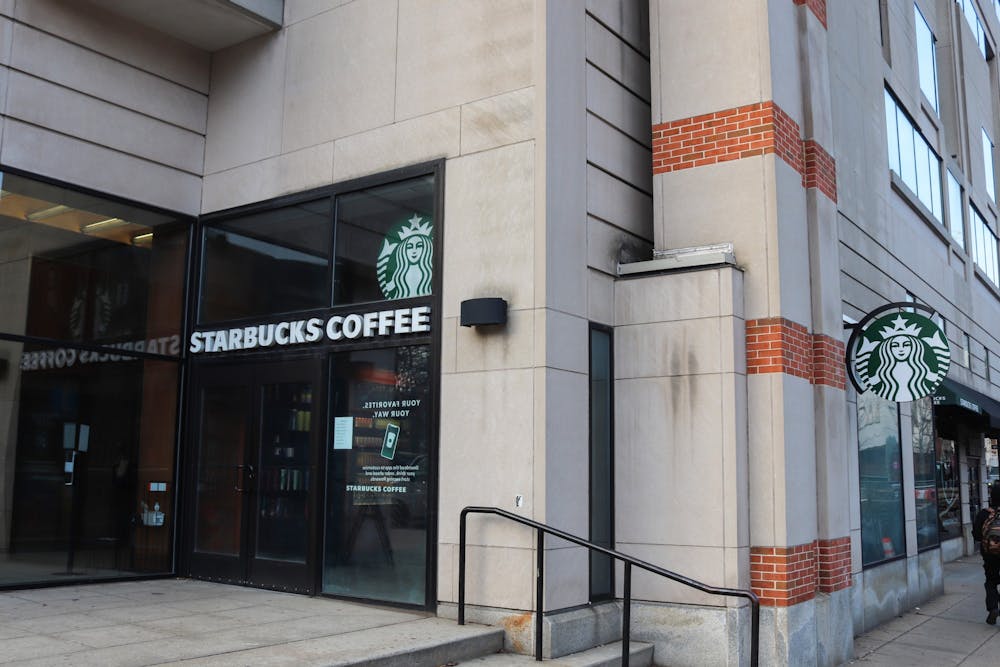
The Starbucks at 34th and Walnut streets on Jan. 10.
Credit: Abhiram JuvvadiThe National Labor Relations Board filed a complaint against Starbucks, citing allegations of union busting at its 34th and Walnut streets location.
In the complaint, which was filed on Jan. 23, the NLRB alleged that Starbucks store managers discouraged workers from participating in a union by reducing hours and wages, as well as failing to bargain with already unionized employees — thereby violating the National Labor Relations Act. The complaint, which also alleges that two employees were fired for participating in union activities, was also filed against Starbucks' 20th and Market streets location, according to The Philadelphia Inquirer.
In response to a request for comment, Starbucks contested the validity of the complaint in regard to disobeying the NLRA and defended its actions at the Philadelphia locations.
“We disagree with the merits of the complaint and maintain that actions taken at our Philadelphia area stores were in full alignment with established policies and the National Labor Relations Act,” a Starbucks spokesperson wrote to The Daily Pennsylvanian. “We look forward to a full legal review of the matter as we work side-by-side with our partners to deliver the Starbucks experience and reinvent our company for the future."
Jo Schermerhorn, a shift supervisor at the 34th and Walnut streets location, said that Starbucks told him and other protesters that they could not picket outside the storefront last December, despite legally being allowed to do so.
“We filed ethics complaints against some of the managers for their behavior during the last strike around December,” Schermerhorn said. “One of the store managers got aggressive really quickly, saying that if anyone were to bump into him, he would get his friend from South Philly to come and take care of us.”
Schermerhorn added that many Starbucks workers at his location experienced a reduction in hours, with his hours cut in half. While Starbucks company leadership makes decisions about cuts to the number of weekly houses that workers can use, individual store managers determine who has access to those hours and how many.
“[Starbucks has] been drastically cutting labor and not giving us hours that we need,” Schermerhorn said. “A lot of us are really unsure of how we’re paying our rent right now.”
Tzvi Ortiz, another shift supervisor at 34th and Walnut streets, said that many Starbucks employees find the pattern of cutting hours akin to union busting, especially since the store is not always properly staffed for busy days.
“We weren’t as busy around the holidays [so Starbucks] kept sending people away, but they weren’t giving us enough people to do the amount of things they wanted us to do,” Ortiz said. “Then the students came back and we were really short staffed. We frequently don’t have people for support.”
Despite employees’ hours being cut, Schermerhorn told the DP that the 34th and Walnut streets location is still seeing soaring numbers and business.
“We can see predicted metrics for the current date based on sales from last year [and] what we actually did in sales on our sales reports which shows how many transactions we do every half hour,” Schermerhorn wrote in a statement. “Those that have been there the longest have never seen volumes this high.”
The 34th and Walnut streets Starbucks first unionized in May 2022 with a unanimous vote, among a host of other Starbucks locations making similar efforts. The employees said they found it necessary to organize their labor demands as a way to protect against the corporation from “unfair wages, inconsistent scheduling and staffing issues, safety violations, and harassment.”
Janice Bellace, a professor of legal studies and business ethics at the Wharton School, said that union workers face significant challenges when confronting a powerful, multinational corporation like Starbucks.
“Starbucks will be very resistant,” Bellace said. “They will refuse to agree, and then it will force the union to just say ‘okay, we accept what you’re giving us.’”
Bellace added that she notices a contradiction between the words and actions of the Starbucks brand.
“They have cultivated this image of being very progressive," Bellace said, "and then people will say, ‘we’d like to earn a certain amount if we stand here and work,’ and they strongly resist it.”
According to the Inquirer, Starbucks is expected to issue an official response to the complaint by Feb. 6 and attend a hearing scheduled for Feb. 13. Bellace was uncertain about the outcome of the hearing.
“It’s so fact specific,” she said. “It’ll be very important what witnesses the union can have or what they’ll say, and the credibility of the witnesses.”
The Daily Pennsylvanian is an independent, student-run newspaper. Please consider making a donation to support the coverage that shapes the University. Your generosity ensures a future of strong journalism at Penn.
Donate



